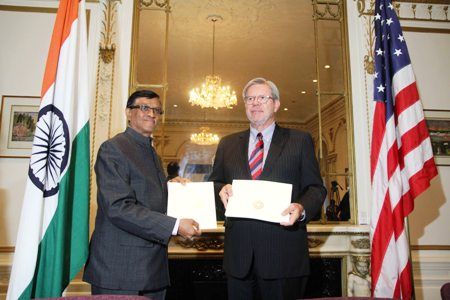 Rutgers University, a leading New Jersey-based national public educational institution, signed a memorandum of understanding with the Indian government last month to launch the Indian Council of Cultural Relations chair of contemporary Indian studies in Rutgers.
Rutgers University, a leading New Jersey-based national public educational institution, signed a memorandum of understanding with the Indian government last month to launch the Indian Council of Cultural Relations chair of contemporary Indian studies in Rutgers.
The MoU was signed by New York Consul Geneal Dnyaneshwar Mulay on behalf of the ICCR and Richard L Edwards, executive vice president for Academic Affairs and interim Chancellor, Rutgers University to initiate this academic partnership.
The partnership will bring a distinguished visiting professor annually from India to teach courses on different subjects, deliver public lectures, and engage directly with staff and students at Rutgers University.
Under the collaboration of the Singh-Obama 21st Century Knowledge Initiative, Rutgers University was one of five institutions with Tata Institute for Social Sciences as its partner institute to be awarded the grant in the first round of awards announced during the India-US Higher Education Dialogue in 2012.
As part of the study tour for this international scholar exchange, the university and representatives of TISS held a panel discussion.
The latter had experts talking about reforming education and training systems, higher education and skills development in a transnational context.
The initiative was announced by US President Barack Obama and India’s Prime Minister Manmohan Singh in 2009 to encourage mutual understanding, facilitate educational reforms and foster economic development.
It also stressed the need to engage civil society through academic cooperation with Indian institutions of higher education.
Rutgers was one of the five out of more than 100 applicant institutions to receive an approximately $250,000 grant from the Obama-Singh fund.
The programme was an affirmation of the two leaders' commitment to enhance India-US partnership in education.
Each government pledged $5 million for this endeavour to encourage mutual understanding, facilitate educational reform, foster economic development and engage civil society through academic cooperation.
The 2011 US-India Higher Education summit in Washington, DC identified a set of key priorities for each country.
For India, the most pressing need, the summit noted, was to reform its skill development system with scalable solutions that can rapidly enhance educational opportunities for 550 million Indians aged 25 and under.
For the United States, the goals were to expand the number of American students and faculty with experience in India.
‘Both nations are struggling to create enough jobs for their growing number of graduates,’ the summit had noted.
Edwards said that the partnership offers an exciting opportunity to unify many of the university’s efforts with Indian institutions and raise its visibility.
Strengthening relationship with India will help Rutgers to promote collaborative research and global citizenship throughout the Rutgers community, he said.
So, is it going to be a one way street in terms of educational collaboration?
“We anticipate a reciprocation in due course. It means while we get professors from India, we too will send people from the faculty to teach there.
“We already have faculty members that go to various institutions in India but we want to set up an exchange programme.
“We have just been talking about that with the ambassador here for setting up a centre for India Studies at Rutgers.
“We believe that these kinds of relationships are good if they act both ways,” Edwards told India Abroad.
“We think we have much to learn from India.
“We think there could some very interesting research related collaborative efforts between Rutgers faculty and faculty members in India.
“We would like our students to experience what it is like to be India and it is very important to us because there so many people from India that live in New Jersey.
“So we really want to have this as a two-way street for opportunities and exchanges,” Edwards said.
“This is just the beginning of our relationship.”
“Many times when our faculty members go to India, it is for a relatively short period of time -- to give lectures, to take classes.
“But we would like to see more of that happening. Our focus is on five countries that primarily includes India.”
Rutgers is thinking about student exchange programmes with India like many other schools, he said, in response to a question.
“We already have some students who go to India on individual basis but we would like to see that programme becomes a more robust one.
Edwards said that the programme for visiting professorship is likely to take off by next fall.
“But there are a lot of things to be sorted before that,” he said.
Image: New York Consul Geneal Dnyaneshwar Mulay on behalf of the ICCR and Richard L Edwards, executive vice president for Academic Affairs and interim Chancellor, Rutgers University; Photograph: Paresh Gandhi/Rediff.com






 © 2025
© 2025